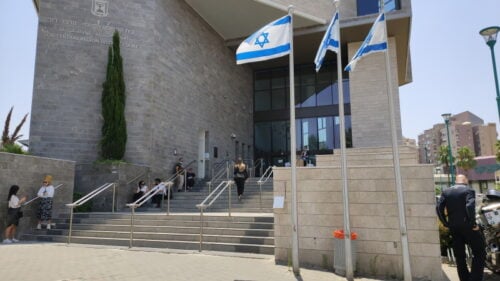
The District Court in Central today (Wednesday) ordered the Brenner Regional Council to respond to the request of the residents of Beit Elazri and build a mikveh tahara at their request. The decision was made following a petition by 220 residents of the Beit Elazari moshav who petitioned the Brenner regional council (where the moshav is located) and the local committee of the moshav to oblige them to build a mikveh tahara in the moshav.
The court ruled that the petitioners have a fundamental constitutional right to freedom of religion and worship, and that this right is not limited only to halachic commandments and religious people, and that each person may exercise it according to his faith. The court ruled that the authority to decide on the establishment of the mikvah is the authority of the regional council and not of the local committee, although the position of the committee must be taken into account.
The court ruled that the individual’s right to freedom of religion is not absolute, and the authority’s duty to take action to that end is limited by the existence of a public need. But such a public need has been proven in this case, when the petitioners make up over a quarter of the population of the seat. The court added and stated that against the realization of the right to freedom of religion, considerations of public resources (in terms of funding and real estate) must also be considered, and considerations of maintaining the secular nature of the moshav can also be considered under certain circumstances. However, freedom of religion should be given priority, because it is a fundamental constitutional right against interests.
In this case, it was ruled that the budgetary argument is incorrect, because the Ministry of Religious Services provides funding, and there are also private guarantees to complete the funding. As for the argument regarding the availability of land, it was ruled that the council will examine it on its merits and it is assumed that it will act in accordance with the provisions of the law to allow this. In relation to the consideration of the secular character of the moshav, it was determined that the construction of the mikvah would not harm this character. The court emphasized that this is not a matter of religious coercion on the majority, but rather a question of a shared life that includes religious practice of individuals in society. The court added and determined that in this case there is no harm to the secular character also because it is a small and modest structure for private activity that is done modestly and privately; and that in any case a secular character means pluralism and tolerance for the personal choices of each person in society.
The court concluded that the regional council did not consider all the correct considerations and did not properly balance them, and its decision was extremely unreasonable. Because of this, taking into account the long time that has passed and the procedures that have been required since the treatment of the matter began, and since the council did not change its position even when it examined the matter during the trial – an operative order must be given, and the matter should not be brought back to the council for re-discussion. In light of all of the above, the petition was accepted, and the council was obliged to act to establish a mikveh in Moshav Beit Elazri as soon as possible.

